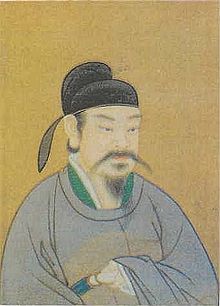Tang Xianzong
Tang Xianzong († 820 ) was Emperor of China from 805 to 820 . He is considered to be the most important ruler of the Late Tang period.
Tang Xianzong was born to Prince Li Song. His birth name was Prince Li Chun. During his reign, Li Chun's grandfather, Emperor Tang Dezong , tried in vain to fight the de facto independent military governors that arose after the An Lushan rebellion, especially in the northeastern provinces. The notorious lack of money of the late Tang period prevented the success of the actions, so that the military lords had to be left in their positions. Towards the end of his reign, the emperor's favorites, including many eunuchs, became dominant in state affairs. Opposition to this arose that rallied around Li Chun's father, Li Song. This reform Confucian movement called for a comprehensive administrative reform to end the conflict of powers between the emperor's favorites and the regular bureaucracy. After Dezong's death, Li Song was able to take over as Emperor Tang Shunzong for eight months before the previously ailing man died. The previous Crown Prince Li Chun had the leaders of the Reform Party banished as Emperor Xianzong. These included eminent civil servants such as Liu Zongyuan and Li Yuxi .
The foreign policy situation at the beginning of Xianzong's reign was favorable. The Tibetans, with whom there had been clashes since the 750s, were encircled by alliances with the Uyghurs and the kingdom of Nanchao and could hardly go on the offensive against the empire. Xianzong took advantage of this situation and began his program against the provincial military governors. In 806 he refused recognition to the new governor of West Sichuan , Liu Pi , and was victorious towards the end of the year with an army mainly under the command of eunuchs. A few months later the war began against the governor of Zhexi , Li Qi , who refused to appear in the capital. Here, too, the emperor achieved a quick victory. Li Qi fell victim to an intrigue among his supporters.
From 810 to 814, Xianzong implemented a series of fiscal reforms to strengthen the court's financial strength. In 812 the new governor of Weibo voluntarily submitted to the emperor. The following years saw fighting in Hebei and Huaixi . These struggles lasted a very long time and resulted in great monetary costs. It was not until 818 that all the fortresses in the region on the upper Huai River could be taken. In 819 Shandong was conquered and at the same time a comparison was made with the warlords of Hebei.
The reform Confucian scholar Han Yu admired Emperor Xianzong for his work of unification and apostrophized him with the rising sun in the east. Even under Xianzong's successor, Muzong , renewed signs of disintegration of the imperial union began to appear. This tendency continued under the following emperors.
literature
- Rainer Hoffmann, Qiuhua Hu: China. Its history from the beginning to the end of the imperial era. Freiburg 2007. ISBN 978-3-7930-9499-9
| predecessor | Office | successor |
|---|---|---|
| Shunzong |
Emperor of China 805–820 |
Muzong |
| personal data | |
|---|---|
| SURNAME | Tang Xianzong |
| BRIEF DESCRIPTION | Emperor of China (805-820) |
| DATE OF BIRTH | 8th century |
| DATE OF DEATH | 820 |
